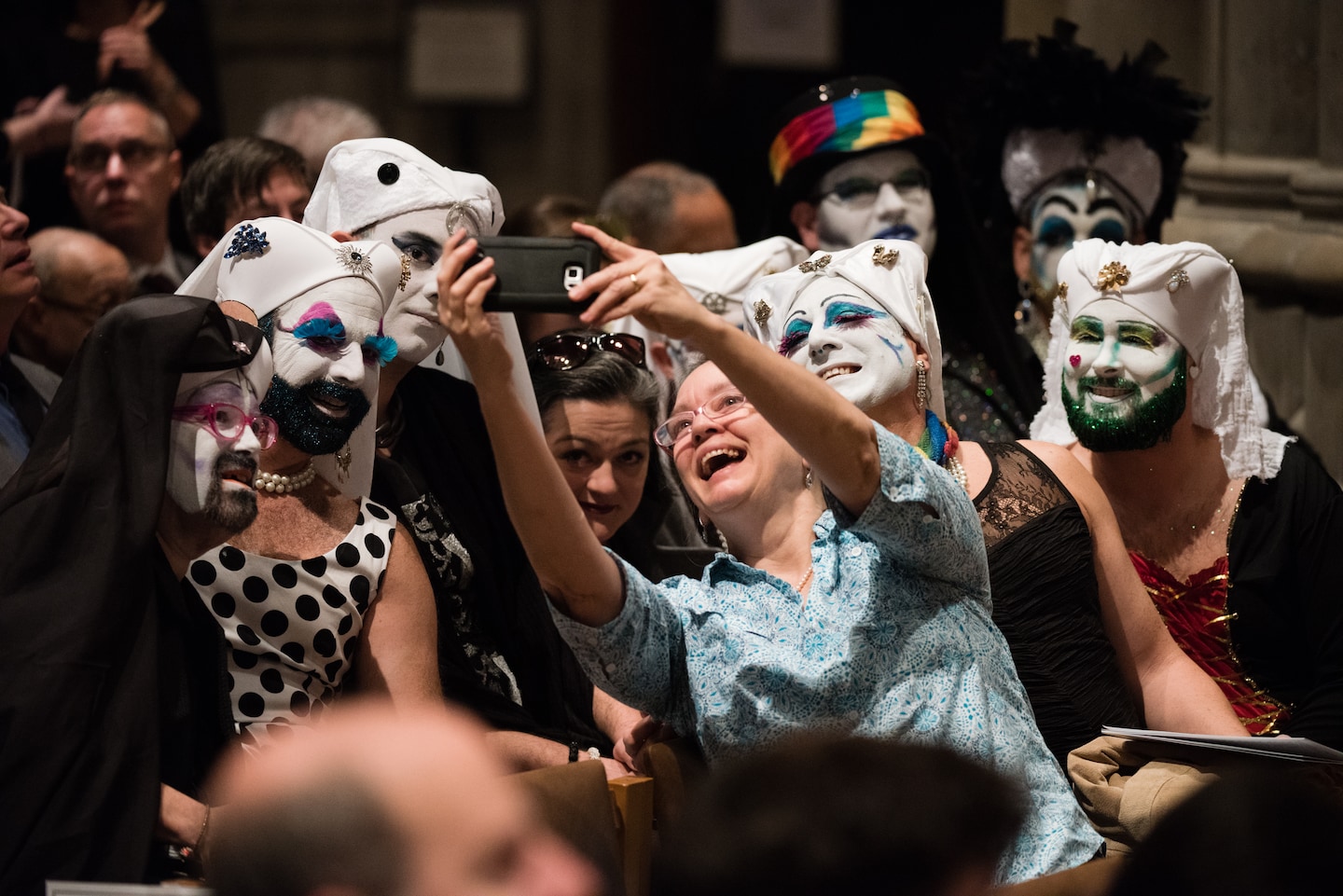Comment on this storyComment
Last month, the Los Angeles Dodgers created a ruckus when the team announced it would invite a group of LGBTQ self-styled nuns called the Sisters of Perpetual Indulgence to receive an award on Pride Night, June 16. Some enraged Catholic groups and players noted the Sisters’ reputation for “making fun of a religion” and successfully pressured the Dodgers to disinvite the group — only for the Dodgers to do an about-face and reinvite them.
The Sisters of Perpetual Indulgence reimagine the church and its traditions and perform parodies of gender and sexuality, actions that have long drawn contempt from their detractors. But the group’s history also includes important community work that has been equally, if not more, divisive than their clothing.
While the fervor over the Sisters’ inclusion during Pride Night is tied to a rise in anti-LGBTQ lobbying, it is also rooted in the Catholic Church’s long-held rules against the use and promotion of contraceptives and the fact that the Sisters of Perpetual Indulgence were the vanguard of safe-sex education during the AIDS epidemic.
On Easter weekend 1979, a group of gay men in San Francisco donned nuns’ habits and traversed the city. Driven by boredom and by frustration with the hyper-butch “Castro clone” look that permeated the gay community — which consisted of Levi’s jeans and leather, a muscular physique and a mustache — they wore attire that challenged the status quo.
A founding member known as Sister Vicious Power Hungry Bitch explained how the major attention the Sisters received shaped their work: “We should use it as a tool for social change, for the change that we want to see.” That summer, she and four other founders — Sister Missionary Position, Reverend Mother, the Abbess and Sister Hysterectoria — created that change by forming the Sisters of Perpetual Indulgence “to promulgate universal joy and expiate stigmatic guilt.”
Over the years, the Sisters grew in number in San Francisco and outside the city, with over 40 chapters in the United States and 20 more abroad. The Sisters could be spotted at gay protests, marches, fundraisers and faith events. Over time, they expanded their mission to include a devotion “to community service, ministry and outreach to those on the edges, and to promoting human rights, respect for diversity and spiritual enlightenment.”
However, it was the emergence of a mysterious disease in 1981, and the experiences of seeing friends and lovers of the gay men in their circles dying, that mobilized them. In the early years of what would become known as the HIV/AIDS epidemic, there were very few places for the LGBTQ community to turn for help. The White House all but ignored the issue. President Ronald Reagan did not attend any meetings about the crisis until 1985 and the White House press secretary made light of the epidemic by cracking homophobic jokes when reporters asked questions about it.
In the early 1980s, the national media also paid little attention. When reporters did cover HIV/AIDS, they called it a “gay cancer” or “gay pneumonia,” which further stigmatized the LGBTQ community by linking its members directly to the disease. The disease was even commonly known as Gay Related Immune Deficiency, or GRID, which falsely focused on identity rather than behavior as the cause, until the term AIDS (acquired immunodeficiency syndrome) was created in 1982.
The Sisters stepped into the void left by the media, the federal government and the church and took the lead in promoting sex education for the community.
Several of the Sisters based in San Francisco collaborated with a doctor to create the first safe-sex pamphlet in 1982, calling it “Play Fair!” The creators, including Sister Florence Nightmare, who had experience working in public health and had grown ill from the disease herself, raised money to produce copies of the pamphlet and distributed 16,000 free copies during San Francisco’s summer International Lesbian and Gay Freedom Day Parade.
“Play Fair!” merged medical advice with camp humor to fight the stigma that had long plagued discussions of sexual practices and to explain how to make sex safer for gay men.
And, crucially, it highlighted condoms as a tool to prevent the spread of sexually transmitted diseases (STDs).
Rather than depict sex as dangerous, the pamphlet adopted a form of sex-positivity that sought to eliminate guilt and shame — tenets important to the Sisters’ mission and ones that mirrored the language from the gay liberation movement. To emphasize this, “Play Fair!” concluded by listing “Guilt” as an STD — contracted, according to the Sisters, through the “Judeo-Christian tradition of morality” and “Catholic schools.” The cure, they wrote, could be found in “respect” and love for oneself and others.
In calling for using protection during sex and abstaining from shame, the Sisters’ approach stood in stark contrast to the Catholic Church’s handling of the AIDS epidemic. While some nuns and priests quietly administered care to LGBTQ people suffering from AIDS, most church leaders continued to hold condom use as amoral and homosexuality as sinful and even, according to the Vatican, “an objective disorder.”
It was not until 1987 that the U.S. Conference of Catholic Bishops considered — albeit reluctantly — the teaching of condom use in schools justifiable. The Catholic secretary of education explained that the choice of promoting condoms to stop death was “a toleration of a lesser evil to prevent a greater evil.”
The epidemic grew rapidly as the Catholic Church debated its stance. By the end of 1988, more than 60,000 people had died in the United States from AIDS-related complications — surpassing the number of U.S. fatalities during the Vietnam War.
While the church largely stuck to its positions, the Sisters continued to develop their safe-sex campaigns. They ran “bar ministries,” distributing condoms at LGBTQ bars while discussing AIDS prevention, and they appeared on floats at Pride parades around the world to promote condom use. In 1991, they introduced the Condom Savior Consecration and Vow, with the call and response: “Latex equals sex. Latex equals life. Latex equals love.” As scholar Jason Crawford put it, the Sisters were “turning condoms into the instruments of human salvation.”
The Sisters are more than just their style and gender expression. They view themselves as a religious order rooted in ministry and dedicated to reimagining religion with the goal of promoting community and self-acceptance. And, crucially, they were on the front lines of the AIDS epidemic promoting safe sex to save lives when it was unpopular to do so.
Now, in 2023, the Dodgers’ invitation for the Sisters to receive the Community Hero Award has caused new anxiety and debate. Although some of that concern may very well be rooted in the fear that the Sisters will spread ideas of gender fluidity or comical representations of Catholic tradition, controversy also stems from the promise that they will spread the gospel of safer sex by celebrating condoms.
Discovered on: 2023-06-16 12:00:10
Source: Honoring the Sisters of Perpetual Indulgence rewards life-saving work



